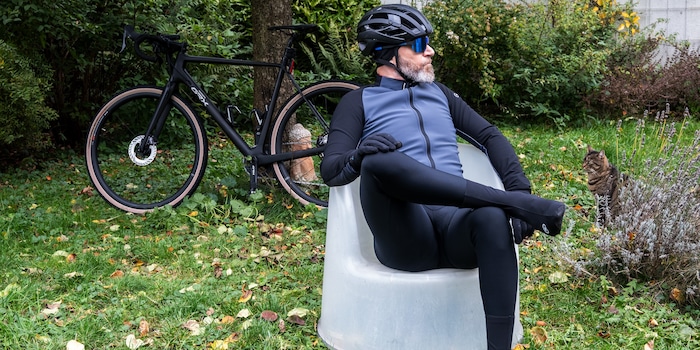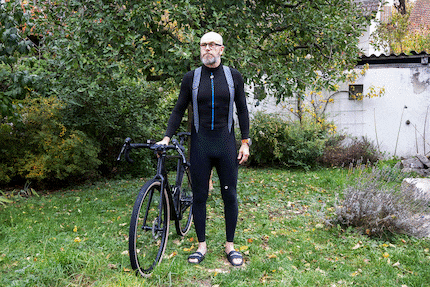
Guide
Bardelli rides in Castelli – you can too, but you don’t have to
by Patrick Bardelli

Finding the right clothes to wear on a bike is complicated, but crucial. Especially in autumn and winter. With this in mind, here’s (almost) everything you need to know about what to wear, how to wear it and when.
Cycling in winter is cool. Literally. But with the right gear and, most importantly, the right clothing, you won’t get chilly. Just as I did for the summer edition of this guide, let me start with a disclaimer: obviously, you can wear whatever you want on your bike.
Maybe you cycle to work. Maybe you use your bike to nip to the bakery for your Sunday morning bread rolls. Or maybe the colder months prompt you to do exclusively indoor training on an exercise bike, your actual bike lying lonely and abandoned in the basement until next spring. But maybe, like me, you use your bike like a fitness machine. Outdoors, in (almost) all weathers. This is where finding the right clothing really starts to get difficult. Especially in autumn and winter.
So without further ado, here’s my clothing guide for road and gravel bikes for the winter months.
«Layering» is the magic word. It’s the same story in spring and summer. However, since outdoor temperatures are lower in autumn and winter, with the wind blowing colder as a result, layering is especially important. Wind chill factor, be damned! Still, wearing multiple layers won’t do any good if your clothes are flapping around in the wind. When this happens, the cold creeps through the layers and you start to freeze. Which means you’ve got to keep things tight.
Skin-tight clothing doesn’t just keep the cold out, it also keeps in the body heat you generate when cycling.
Wearing these three layers, you’re well protected against moisture and cold – even dressed in lightweight clothing. This is the result of small air pockets forming between them, which store body heat. So don’t bother with a thick down jacket when cycling in winter.
When you’re stationary, the outside temperature should feel a touch too cold. Once your body’s own central heating system kicks in after a few minutes, it’ll be just right. If you find yourself sweating before you’ve even started pedalling, you’re too warmly dressed.
To sum up:

For my summer bike rides, I clad myself in Castelli gear. Firstly, because these Italian-made products are good. Secondly, because the brand goes well with my surname. For the winter edition of the guide, I’ve opted for Assos. Firstly, because the products are good and secondly, because it’s a Swiss brand. As Assos is headquartered in Ticino, I’m keeping that Latin connection.
It’s important for a bike jacket to be made of windproof, water-repellent material. A cycling jersey is no substitute for a winter jacket. The Assos Mille GT Winter Jacket EVO has been specially developed for cyclists who ride outdoors all year round. Bikers reliant on fabric combinations that not only offer protection and comfort, but also accommodate the bent-over posture of a road bike user. This is an equally crucial aspect in keeping the lower back protected from the elements during a bike ride.
The Mille GT C2 is breathable, moderately insulated and dries quickly. This preserves a comfortable microclimate, even in cold weather, without things feeling too stuffy if the day gets warmer. The cuffs on the sleeves are of a reduced volume, allowing gloves to be worn over them. To keep you safe when cycling in poor light conditions, the detailing on the jersey’s rear hem is reflective. A built-in eyewear holder on the right sleeve gives you space for your sunglasses.
Temperature regulation is the key quality feature of any base layer, especially when it comes to winter varieties. With this in mind, Assos has developed a new Winter LS Skin Layer. Made from a thicker fabric, the base layer has a higher collar and is stretchier than its spring/autumn counterpart. This creates a layer under your other clothes, providing even better insulation. Very fitting, now that autumn’s arrived.
As a continuation of the Winter LS Skin Layer, the Ultraz collection holds in even more warmth, a result of its wool blend fabric. Not only that, but it serves as an even more effective shield against the wind. The manufacturer describes it as the ultimate bottom layer to protect against harsh winter conditions. Perfect for the chilly season.
Getting cold legs while cycling is a drag. In spring and autumn, you can wear shorts and, if necessary, leg warmers. Once winter rolls around, however, a pair of long cycling bottoms is in order. The material of the Assos pants ensures good breathability to maintain a dry, warm microclimate underneath.
Don’t forget, riding a bike involves shearing forces caused by the alternating pressure of the pedalling motion. The slight but constant pelvic movement on the saddle causes painful shearing forces on the periosteum. That’s why investing in both the right saddle and cycle shorts is so important. It’s a science in itself. All I can say is that if you’ve been cycling for any length of time, you’ll already have found the right cycle shorts for you. But if you’re just starting out, you’ll have no choice but to eliminate them by a process of trial and error until you find the perfect ones for your behind. Because every derrière is different. One really important thing to note: DON’T wear underwear with your cycle shorts. Not even in winter.
Assos’ double-knit layers offer breathable insulation and protect your forehead and ears against icy winter temperatures. With its improved fit, the hat is supposed to accommodate long hair well too. Unfortunately, I’m in no position to say whether this is really the case 😉. However, the hat’s breathability means it doesn’t get too hot under your helmet or allow moisture to accumulate inside.
Instead of having microfibre palms, these gloves are made of a new breathable, water-repellent thermotextile that provides good handlebar grip, finger flexibility and a comfortable feel. Microfibres tend to absorb moisture such as sweat or cold splashes of water. Not the case with this new textile. I’m a fan of these gloves.
Assos has optimised their winter socks, kitting them out with a soft toe panel that improves thermoregulation. As a result, the socks are supposed to last a long time. The leg of the sock has been extended from 15 cm to 17 cm, increasing insulation and reducing the risk of gaps cropping up between your socks and cycling pants.
The GT Winter Booties are made from the same membrane-lined material as Assos’ winterproof jackets, giving your feet and ankles full protection in cold, wintry weather. The downside? Putting them on and taking them off is quite the hassle. If they had a velcro fastener on the sole – the kind found on overshoes made by other manufacturers – they’d be easier to pull on and off.
Never ride your bike without glasses. A simple rule that’s especially true in autumn and winter. Not only do they protect your eyes from annoying bugs and stones, but they also stave off the headwind, which can get icy at this time of year. This way, your eyes won’t water and you won’t have to worry about getting eye infections.
Anyone who knows me will be aware that when it comes to cycling glasses, there’s only one pair for me...
In winter, I try to avoid routes at overly high elevations. As you cycle uphill, you start sweating in your winter clothes on the way up. On your way down, the wind then cools you down again and you end up freezing. Where I live, this is easy in part, as we don’t have any high mountains here. On the other hand, I’m still constantly riding up- and downhill. It’s never just flat. Even so, I’ve managed to draw up a variety of routes for warm and cold weather, with low and high elevation gains. What this means in winter is going for trails on flat terrain where possible.
Would you prefer to pedal your way through autumn and winter in cycling clothing from another brand? Here’s where to find the rest of the cycling clothing in our range.
Header image: Daniela Rohr
From radio journalist to product tester and storyteller, jogger to gravel bike novice and fitness enthusiast with barbells and dumbbells. I'm excited to see where the journey'll take me next.
Practical solutions for everyday problems with technology, household hacks and much more.
Show all